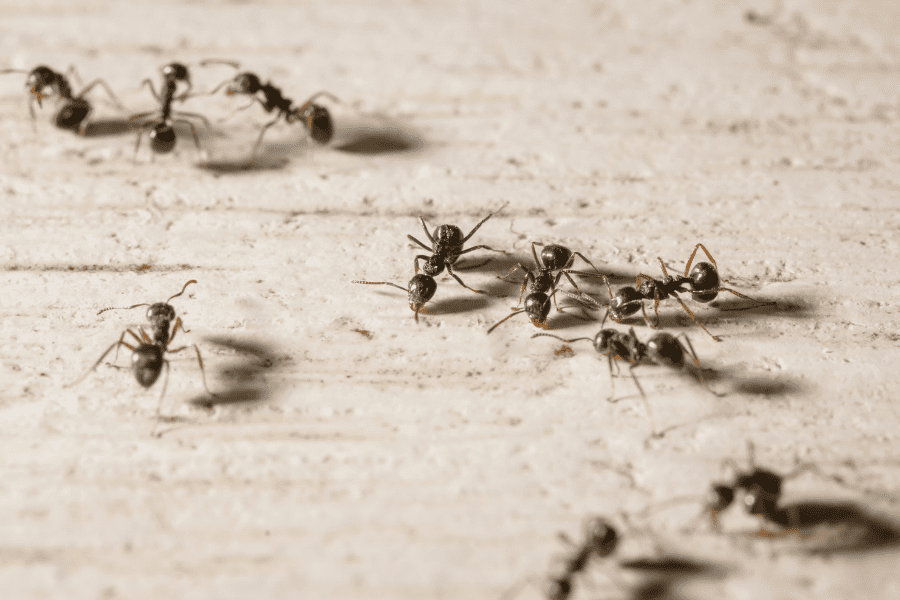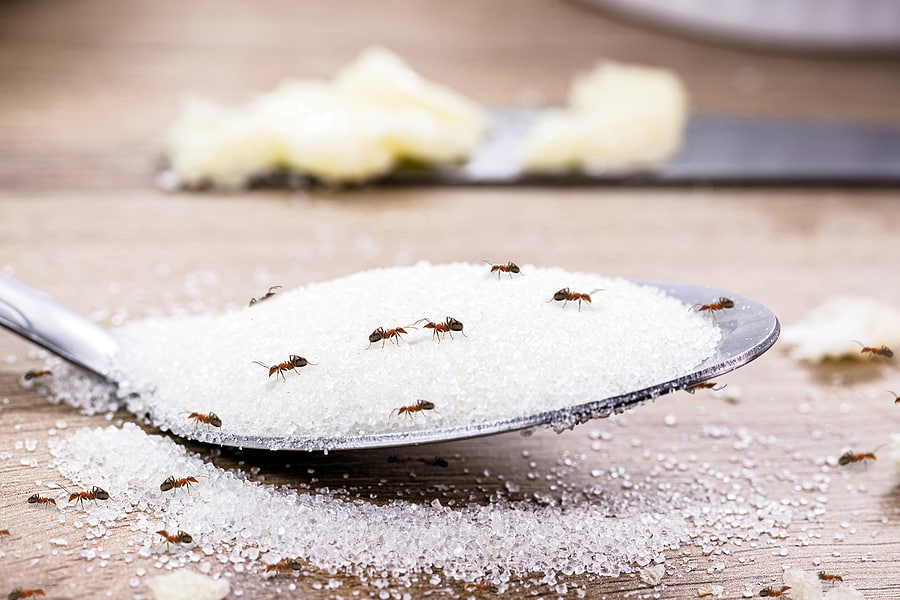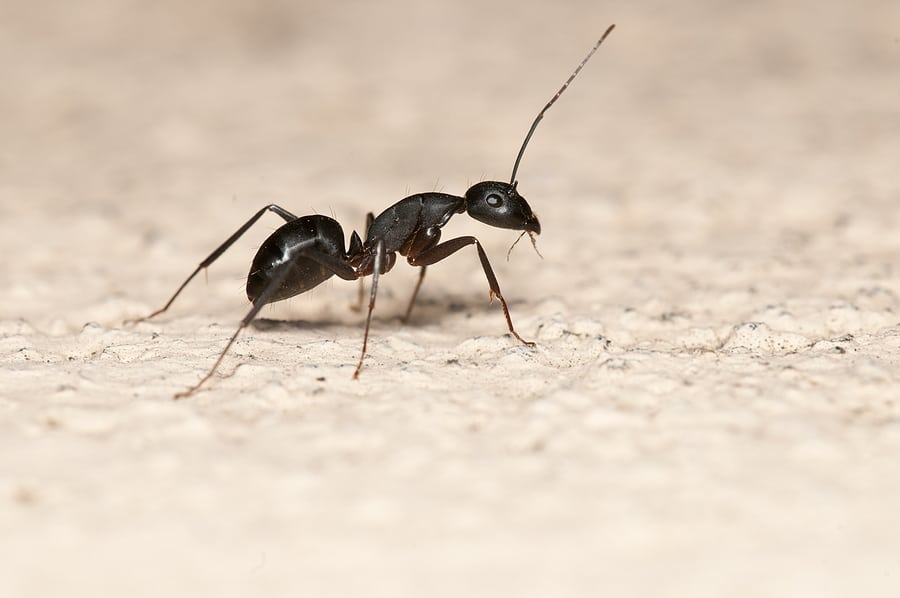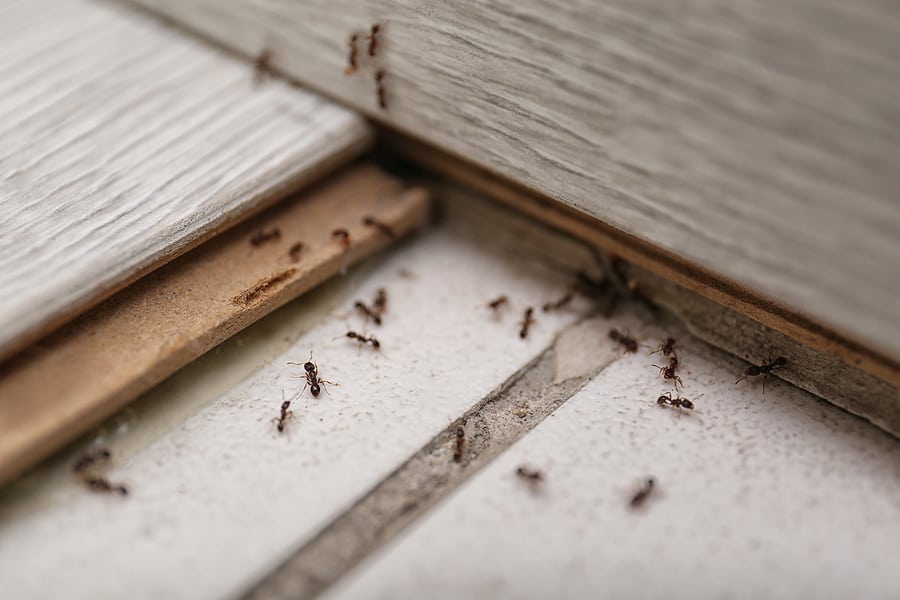READY TO GET STARTED?
REQUEST A FREE ESTIMATE
Fill out the form below or call (888) 466-7849 for a free, no-obligation estimate.

Ant infestations are a common household nuisance in Georgia, where warm temperatures and humidity create ideal conditions for these tiny invaders. Whether they’re in your kitchen, bathroom, or backyard, ants can be a persistent problem that requires proactive pest control solutions and, oftentimes, the use of an ant control company. Understanding the types of ants found in Georgia, how to eliminate an ant infestation, and the best prevention strategies will help restore peace of mind in your home.
Several species of ants frequently invade homes across Georgia. Identifying the type of ant you’re dealing with is the first step in determining the right ant control solution.
Discovering ants invading your home can be frustrating, but with the right approach, you can get rid of ants and prevent them from returning. Here’s how:
Ants typically enter homes through tiny cracks, gaps, and openings around windows, doors, and plumbing. Inspect your home thoroughly and seal any potential entry points to cut off their access.
Ants are drawn to food crumbs, spills, and standing water. Keep your kitchen clean by wiping down surfaces, storing food in airtight containers, and fixing leaky pipes to eliminate moisture.
Certain natural ingredients can help deter ants from invading your home:
Ant baits are an effective method for controlling colonies. The ants carry poisoned bait back to their nest, eliminating the entire colony over time. Be patient, as bait traps can take several days to work.
If DIY methods don’t resolve the ant problem, it’s best to seek help from an experienced ant control company. Professional ant exterminators near you will assess the infestation, identify the species, and apply targeted treatments for long-term results.
Preventing an ant infestation is easier than dealing with one. Here are essential pest management tips to keep ants from invading your home:
While some homeowners may attempt to handle an ant infestation on their own, professional pest control services offer a more effective and long-lasting solution. Here’s why hiring an ant control company is beneficial:
Ants invading your home can be a persistent and frustrating problem, but with the right approach, you can eliminate them and prevent future infestations. Whether you need immediate assistance or ongoing pest management, partnering with a reputable pest control company will ensure your home remains ant-free.
If you’re struggling with an ant infestation, don’t wait until the problem worsens. Contact a trusted ant control company today for a consultation and enjoy the peace of mind that comes with expert pest control services.

Ants are a common pest that can invade your kitchen and other areas of your home or yard. Not only are they annoying, but they can also get into your food and be difficult to remove from your home. Let’s explore different types of ants and provide tips on how to prevent them from entering your home or yard.
There are many different types of ants, but some of the most common ones found in kitchens include: Argentine ants, carpenter ants, and odorous house ants. Argentine ants are small and brown, while carpenter ants are larger and can cause damage to wood structures. Odorous house ants are small and black and emit a strong odor when crushed.
If you have a specific type of ant that is causing problems in your home or yard, there may be specific prevention methods that are more effective. For example, if you have carpenter ants, it’s important to remove any rotting wood or other sources of moisture that may be attracting them.
Our team of experts are ready to help you identify what type of invading ant you have in your home. Give your local pest control company a call for a free inspection today!

The kitchen is one of the most common rooms in your home to have ants, closely followed by the bathroom. The most common ants found indoors are odorous house ants, also known as nuisance ants. While these ants don’t cause structural damage and aren’t considered dangerous to humans or pets, they can contaminate your food and become quite a nuisance to deal with. Carpenter ants are larger black ants that can also get into your home. These ants do cause structural damage by boring through the wood components of your house.
The ants you find in your home don’t actually live there; they build colonies outdoors and come in looking for food and water to take back. These elements are necessary for the colony to live and grow. Scout ants who find these sources leave a pheromone trail for the rest of the colony to follow which is why you will often see ants traveling in a single line. Because they can scale walls and travel between stories in your home, they can spread quickly and be extremely difficult to get rid of.
Ants are attracted by a number of things found in your home. They use crumbs, spills, loosely sealed food packages, dirty dishes, and even pet food bowls to find food. They use leaky pipes, pet water bowls, and standing water for hydration.
What can you do to keep ants from taking over your kitchen? Prevent ants by:
Killing just the ants you find in your home won’t eliminate the entire infestation. You must eradicate them at the source – at their colonies. These ants can be difficult to eliminate because individual colonies can number in the thousands and they can be spread out all over your property. For assistance in dealing with ants or any other pests you may find in your home, contact your local pest control company for an evaluation.
9 Easy Ways to Keep Birds Away

Ant season peaks in the spring and summertime, with these pests oftentimes finding their way inside your home. But did you know that carpenter ants remain active throughout the year? In return, they can cause damage to your home and infest.
Carpenter ants will nest in damaged wood, usually softwood damaged from water. Carpenter ant damage includes excavating wood to expand their nests, often making holes throughout exposed wood. If these ants are found inside, it is also an indication that there is a water issue, such as a leak.
While these ants are most active in the spring and summer, they are also known to infest homes during the winter months, as well. They will forage for food and water, looking for proteins, fats, and sugars. Once inside, these ants will look for a moist environment to help them survive. They can often be found in bathrooms, kitchens, pipes, and roof vents.
While carpenter ants do not die off in the winter months, they will instead become dormant when the temperatures drop. This usually depends on where they have built their nests and how much the temperature has dropped. If they have already found themselves inside, they will remain active or revive from their dormant state once the heat from the house has risen.
To prevent ants from entering your home this fall and winter, consider placing these preventative measures throughout your house,

Little black ants are a common household pest usually seen in larger swarms during the warmer months of the year. These ants can be a huge nuisance, commonly infesting areas such as the bathroom and kitchen, searching for food and a place to nest. Once ants become a problem, it can be difficult to control them; but with some easy preventative measures, you’re less likely to encounter these pests!
Ants are always in search of food. Eliminating any food source that they have easy access to will be a major part of preventing them. After every meal, wipe down countertops and tables of any food crumbs or spills left behind. Don’t forget about your appliances either; ensure that your stove, microwave, and sink are also cleaned frequently. To prevent these pests from infesting your pantry, use sealed containers for any dry goods. Consider placing a bay leaf in canisters of dry food like flour to repel ants.
To survive, ants need water. Eliminating moisture throughout your home is key to ant prevention. Take some time to look around the interior and exterior of your home. If you notice any leaks, make sure you repair them immediately. Check your gutters often to make sure there are no clogs. Consider installing gutter guards to help prevent clogs. Additionally, make sure that the downspout is directing away from your foundation.
Being as little as they are, ants only need a small gap or hole to make their way inside. It’s essential to identify entry points and seal them properly to avoid infestation. Look around the interior and exterior of the home to look for these gaps. Popular places include areas where pipes and wires enter your home. Check your windows and door screens for any open holes and replace weatherstripping frequently.
Preventing ants can be difficult and feel impossible. If you’ve noticed an increase in ant activity around your home, consider contacting your local pest control provider. These professionals will complete a thorough and comprehensive treatment and control plan.